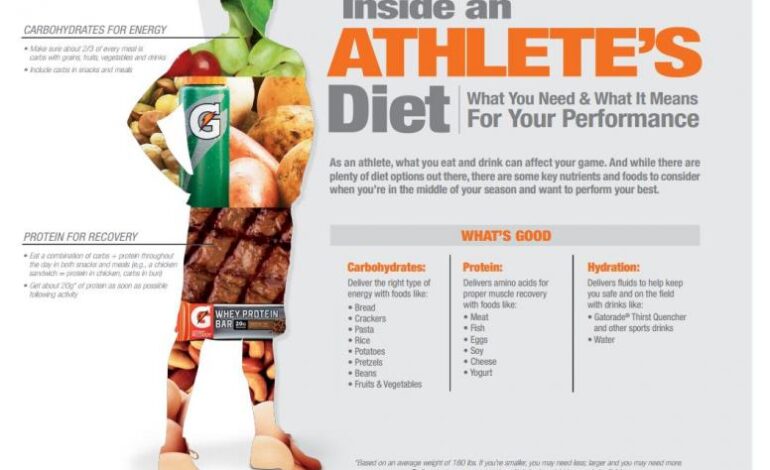Fueling Your Performance: Nutrition Tips for Athletes

“`html
Fueling Your Performance: Nutrition Tips for Athletes
For athletes, nutrition isn’t just about feeling good; it’s a cornerstone of peak performance. Whether you’re a seasoned marathon runner, a competitive weightlifter, or simply enjoy recreational sports, the food you eat directly impacts your energy levels, recovery time, and overall ability to train and compete at your best. This post dives deep into essential nutrition tips for athletes, covering everything from macronutrient needs to hydration strategies and supplement considerations.
Understanding Macronutrients: The Foundation of Athletic Fuel
Let’s start with the basics – macronutrients: carbohydrates, proteins, and fats. Each plays a crucial role in supporting athletic endeavors. Getting the right balance is key!
Carbohydrates: Your Primary Energy Source
Carbohydrates are your body’s preferred fuel source, especially during intense exercise. They’re broken down into glucose, which powers muscle contractions and fuels high-intensity activities. Different types of carbohydrates have varying impacts on energy release. Simple carbs (like sugars found in fruit and refined foods) offer quick bursts of energy but can lead to fluctuations in blood sugar. Complex carbs (whole grains, starchy vegetables like potatoes and sweet potatoes, legumes) provide sustained energy release.
For athletes, carbohydrate needs vary significantly based on training volume and intensity. Endurance athletes (runners, cyclists) typically require a higher intake – often 6-10 grams of carbohydrates per kilogram of body weight daily. Strength athletes may need slightly less, around 5-7 grams per kilogram.
Protein: Repairing and Building Muscle
Protein is vital for muscle repair, growth, and overall tissue maintenance. Exercise causes microscopic tears in muscle fibers; protein provides the amino acids needed to rebuild and strengthen them. It also plays a role in hormone production and enzyme function.

Athletes need more protein than sedentary individuals. Recommendations generally fall between 1.2-2.0 grams of protein per kilogram of body weight daily, depending on training intensity and goals. Strength athletes aiming to build muscle often benefit from the higher end of this range.
Fats: Essential for Hormone Production & Overall Health
Fats are essential for hormone production (including testosterone), nutrient absorption, and protecting organs. While not the primary fuel source during high-intensity exercise, they contribute to energy needs, especially during lower intensity activities or endurance events.
Focus on healthy fats like those found in avocados, nuts, seeds, olive oil, and fatty fish (salmon, tuna). Avoid excessive intake of saturated and trans fats.
Micronutrients: The Supporting Cast
While macronutrients provide the bulk of your energy and building blocks, micronutrients – vitamins and minerals – are crucial for countless bodily functions that support athletic performance. Deficiencies can significantly impair training adaptations and recovery.
Key Micronutrients for Athletes
- Iron: Essential for oxygen transport to muscles. Deficiency (anemia) leads to fatigue and impaired endurance.
- Calcium & Vitamin D: Vital for bone health, reducing the risk of stress fractures.
- Electrolytes (Sodium, Potassium, Magnesium): Lost through sweat; crucial for maintaining fluid balance, nerve function, and muscle contractions.
- B Vitamins: Involved in energy metabolism – help convert food into usable fuel.
- Antioxidants (Vitamin C, Vitamin E): Protect cells from damage caused by free radicals produced during exercise.
Hydration: The Unsung Hero of Athletic Performance
Dehydration can rapidly impair performance and increase the risk of heat-related illnesses. Hydration is paramount for athletes of all levels.
Hydration Strategies
- Pre-Exercise: Drink approximately 500-750ml (17-25oz) of water or a sports drink 2-3 hours before exercise.
- During Exercise: Aim for 150-350ml (5-12oz) every 15-20 minutes, adjusting based on intensity and environmental conditions.
- Post-Exercise: Replenish fluids lost through sweat. A good rule of thumb is to drink 1.5 liters for every kilogram of body weight lost during exercise.
Timing Your Nutrition – The Importance of Nutrient Timing
When you eat is almost as important as what you eat. Strategic nutrient timing can optimize performance and recovery.
Pre-Workout Nutrition
Focus on easily digestible carbohydrates for energy, with a small amount of protein. Examples: Oatmeal with berries, banana with peanut butter, or a sports bar.
During Workout Nutrition (for longer workouts)
Replenish electrolytes and carbohydrates – sports drinks or gels can be helpful.
Post-Workout Nutrition
The “Anabolic Window”: While the concept of a strict window has been refined, consuming protein and carbohydrates within 1-2 hours after exercise helps repair muscle tissue and replenish glycogen stores. Examples: Protein shake with fruit, chicken breast with sweet potato.
Supplement Considerations
While a well-balanced diet should be the foundation of your nutrition plan, certain supplements *may* provide benefits for some athletes – but always consult with a healthcare professional or registered dietitian before starting any new supplement regimen.
Potentially Beneficial Supplements (with caveats)
- Creatine: Can improve strength and power output.
- Caffeine: May enhance endurance performance.
- Beta-Alanine: Can buffer muscle acidity, potentially improving high-intensity exercise capacity.
- Protein Powders (Whey, Casein, Plant-Based): Convenient way to increase protein intake.
Important Note: Supplements are not a substitute for proper nutrition and training. Focus on building a solid dietary foundation first.
Conclusion
Optimizing your nutrition is an ongoing process that requires attention to detail. By understanding the role of macronutrients and micronutrients, prioritizing hydration, mastering nutrient timing, and carefully considering supplements (with professional guidance), you can fuel your body for peak performance and achieve your athletic goals. Remember consistency is key – small changes over time can lead to significant improvements in both training and competition!
“`



